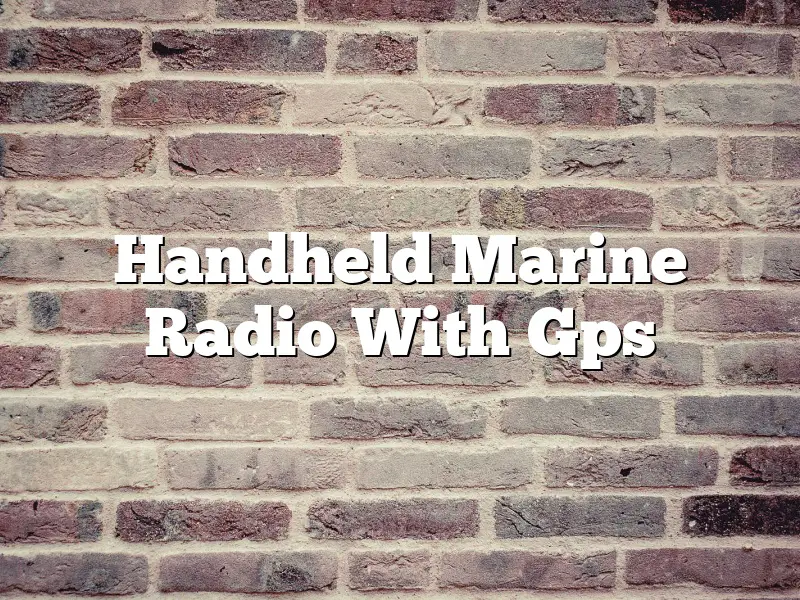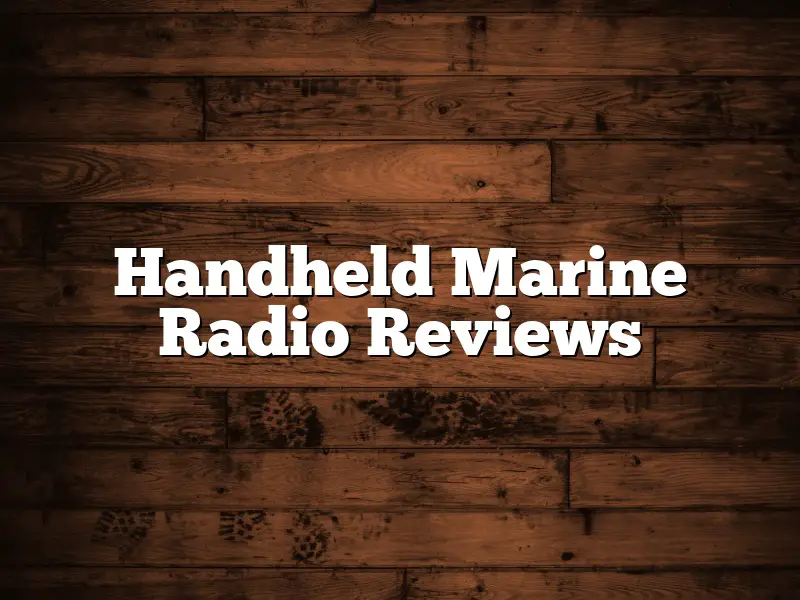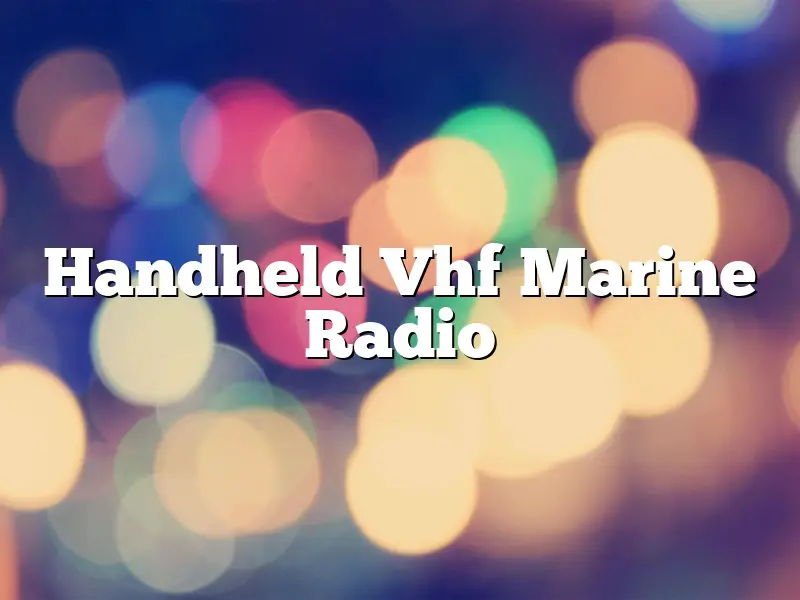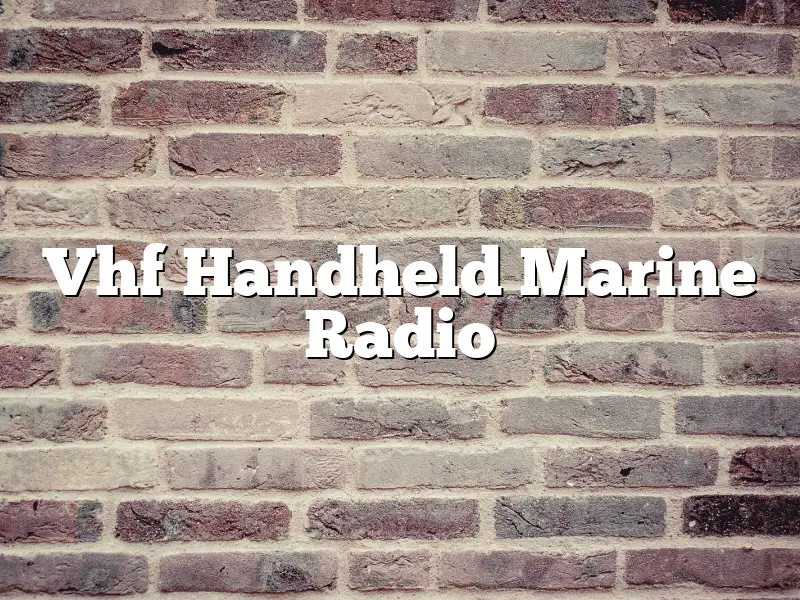A handheld marine radio with GPS is a great piece of equipment to have when you’re out on the water. These radios can provide you with navigation capabilities, as well as communication with other boats or land-based authorities in the event of an emergency.
There are a few different features to look for when purchasing a handheld marine radio with GPS. The most important is that the radio has a global positioning system, or GPS, receiver. This will allow you to track your location on a map and navigate to specific destinations.
Other features to look for include weather alerts, which can keep you informed of dangerous weather conditions in your area, and NOAA weather radios, which can provide you with live updates on weather conditions. Some radios also come with Bluetooth connectivity, which can allow you to pair the radio with a smartphone or other mobile device for additional navigational features.
When choosing a handheld marine radio with GPS, it’s important to consider the size and weight of the unit. You’ll want to choose a radio that is easy to carry and fits comfortably in your hands. The price of the unit is also something to keep in mind, as these radios can range in cost from around $100 to $200 or more.
If you’re looking for a reliable and affordable way to navigate and communicate while out on the water, a handheld marine radio with GPS is a great option to consider.
Contents
What is the best marine hand held radio?
A marine hand held radio is a great piece of equipment to have on a boat. They can provide communication between the boat and shore, as well as other boats. There are a few factors to consider when purchasing a marine hand held radio.
The first consideration is the radio’s power output. The higher the power output, the further the radio can transmit. Most hand held radios have a power output of around one watt. However, there are some radios that have a power output of up to five watts.
The next consideration is the type of antenna the radio has. The type of antenna will determine the range of the radio. A quarter wave antenna will have a shorter range than a half wave antenna.
The final factor to consider is the type of battery the radio uses. Some radios use disposable batteries, while others use rechargeable batteries. Rechargeable batteries are a more environmentally friendly option, but they do require a charger.
When choosing a marine hand held radio, it is important to consider the power output, antenna type, and battery type. The radio’s range will depend on these factors.
What is the range of a handheld marine radio?
A handheld marine radio is a portable device that allows users to communicate with other vessels or land-based stations while out on the water. Most handheld marine radios have a range of up to five or six miles, but this can vary depending on a number of factors, including weather conditions, the type of radio, and the height of the antenna.
Most handheld marine radios use either VHF (Very High Frequency) or UHF (Ultra High Frequency) signals to communicate. VHF signals have a longer range than UHF signals, but are more susceptible to interference. UHF signals are less prone to interference, but have a shorter range.
The range of a handheld marine radio can also be affected by the type of antenna it uses. A longer antenna will typically provide a greater range than a shorter antenna.
Weather conditions can also have a significant impact on the range of a handheld marine radio. Wind, rain, and fog can all reduce the signal strength and decrease the range of a radio.
It is important to keep in mind that the range of a handheld marine radio is not guaranteed, and can vary depending on a number of factors. Always test the radio in a safe area before using it in a situation where range may be important.
How do you hook up a GPS to a marine radio?
A GPS, or Global Positioning System, can be a valuable navigational aid for marine vessels. A GPS can help you determine your location and heading, and can even provide information on tides and currents. If you want to use a GPS with your marine radio, you’ll need to connect the two devices.
Connecting a GPS to a marine radio is a relatively simple process. The first step is to find an open port on the front of the marine radio. Next, find the GPS input port on the GPS unit. This is usually a port on the bottom of the unit. Connect the GPS input port to the open port on the marine radio.
Once the devices are connected, you’ll need to configure the GPS unit to work with the marine radio. This usually involves entering the frequency of the marine radio into the GPS unit. Consult the owner’s manual for your specific GPS unit to learn how to do this.
Once the GPS is configured, it will provide navigation information to the marine radio. The marine radio can then display this information on its screen, allowing you to navigate your vessel with ease.
Can I use my marine radio on land?
Yes, you can use your marine radio on land. However, there are a few things you need to keep in mind.
First, make sure your marine radio is properly tuned to the correct channels. There are specific marine channels that are used for land-based communication.
Second, you may need to adjust the power output of your marine radio. Land-based radios typically require less power than marine radios.
Finally, always use caution when using a marine radio on land. Remember that these radios are designed for use on boats, and they may not be as effective in a stationary environment.
How far will a 6 watt VHF radio transmit?
A 6 watt VHF radio transmitter is capable of transmitting up to about 20 miles in open terrain. However, the distance that a 6 watt VHF radio can transmit will be reduced by the terrain, buildings, and other obstructions. In general, a 6 watt VHF radio will transmit up to about 5 miles in a city environment.
What type of marine radio do I need?
When choosing a marine radio, there are a few things to consider. The first decision is what type of radio to buy. There are handheld radios, fixed mount radios, and VHF radios. Handheld radios are good for emergencies or when you need to keep your hands free. Fixed mount radios are permanently installed in your boat. VHF radios are the most common type of marine radio and can be used either handheld or fixed mount.
The next decision is what features you need. Most marine radios have basic features like channel scanning, weather alerts, and NOAA weather radio. More advanced radios have features like DSC (digital selective calling), GPS, and autopilot control.
The last decision is how much you want to spend. Marine radios range in price from around $50 to $1,000. The most important thing is to choose a radio that meets your needs and fits your budget.
What travels farther VHF or UHF?
What travels farther VHF or UHF?
This is a question that has been asked by many people over the years, and there is no definitive answer. The answer to this question depends on a number of factors, including the terrain, weather conditions, and the power of the transmitter.
VHF signals can travel farther than UHF signals in some instances, but UHF signals can travel farther than VHF signals in other instances. The main difference between VHF and UHF is that VHF signals are limited to line of sight, while UHF signals can travel through some obstacles, such as trees and hills.
The distance that a signal can travel also depends on the power of the transmitter. A transmitter with a higher power will be able to send a signal farther than a transmitter with a lower power.
So, what travels farther VHF or UHF? The answer to this question depends on a number of factors, including the terrain, weather conditions, and the power of the transmitter. In general, VHF signals can travel farther than UHF signals, but UHF signals can travel farther than VHF signals in some instances.





